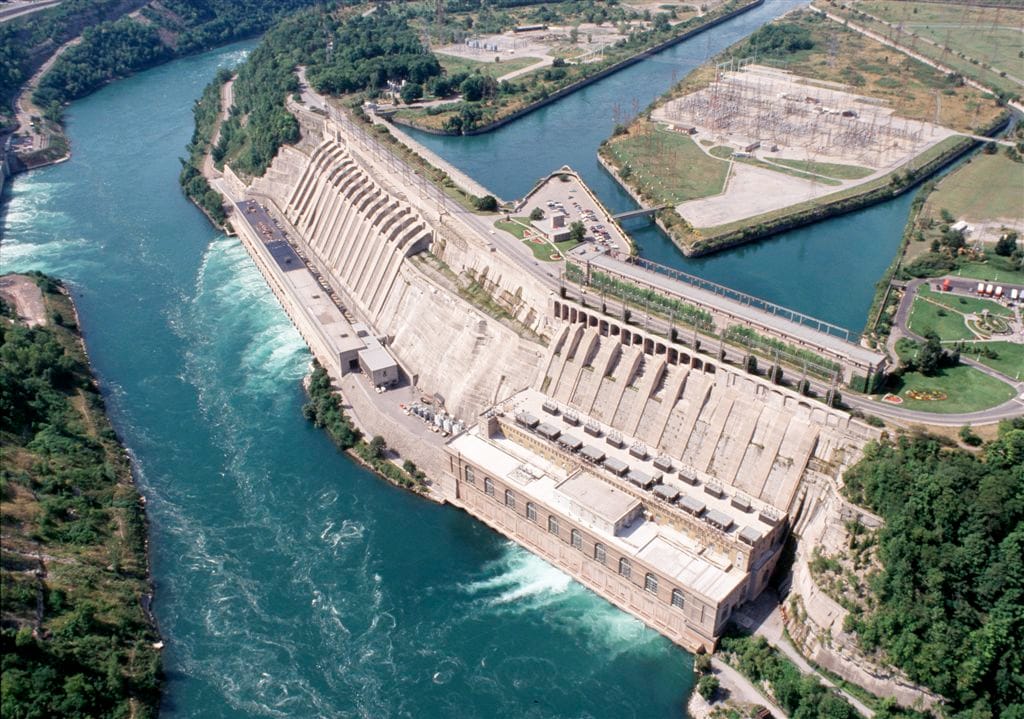hydro

Moving to another country can be disorienting. But moving to Canada, at least to the anglophone provinces, from the United States is different. To the casual observer, things in Canada seem pretty much the same as in the States. But there are minor cultural differences that can trip one up, such as milk being sold in plastic bags. Another of these is the use of the word hydro. In ads for apartments, one commonly sees the line “utilities, except hydro, included.” When I moved to Toronto in 2010, this baffled me. In the United States, typically utilities, with the exception of electricity, are included in the rent. But here, it seemed that electricity was included and water wasn’t. I was well into the search for a place to live when I discovered that hydro meant electricity.
Hydro, of course, comes from the Greek ύδωρ and its combining form ύδρο-, meaning water. It is a clipping of the older hydroelectric (1844) or hydropower (1906).
We see hydro power in a Canadian context in an article with a dateline of 29 December 1911 in Toronto’s Globe and Mail:
Hon. Adam Beck turned on the Hydro power in the home of his birth here to-night. In the presence of almost the entire population of the thriving village. Baden is the first of the smaller towns and villages to use Niagara power, and this evening the streets were illuminated for the first time with electricity generated at the Falls.
Adam Beck was the founder of the Hydro-Electric Power Commission of Ontario
And a few years later we see the clipped hydro referring to hydroelectric power. From a short biography of Beck in Augustus Bridle’s 1916 Sons of Canada:
Had there been no cataract at Niagara, not even the political dominie of Ontario could have produced Adam Beck The product of Niagara, according to Beck, is Hydro-Electric—familiarly abbreviated to Hydro, tabloided to H.E.
And because so much of Ontario’s and Quebec’s electricity was generated hydroelectrically, within a couple of decades hydro was being used to refer to electricity regardless of the source. From Frederick Grove’s 1939 Two Generations, a Story of Present Day Ontario:
“I don’t suppose you have word from down south?” Phil asked of the attendant. “Jarvis way, I mean?”
“That where you’re going?”
“Trying to,” Phil said.
Well-l-l, it’s been sleet there: the telephone and hydro wires are down. You want to be on the look-out.
“Milk trucks coming through?”
“Dunno. Haven’t seen any.”
“Well, doesn’t matter.” Phil laughed as if obstacles in their way and difficulties to be overcome were so many attractions.
“Watch for the road-signs.,” Alice said as she inserted herself behind the wheel.
The attendant, having received his money, rand for shelter, averting his face from the wind.
And we get this in Selwyn Dewdney’s 1946 novel Wind Without Rain:
“Then,” he went on inexorably, “there’s travel. Toronto and Montreal: there’s another fifty down the drain—with the rent that makes practically a hundred and fifty. Balance, a hundred and twenty-five. Food, hydro, water, telephone for September, forty dollars.”
So, hydro is a product of a number of etymological processes. It is borrowed from Greek, compounded, then clipped, then semantically shifted to a new sense that can be confusing to those new to Canada.
Sources:
“Baden’s Ovation to Hon. Mr. Beck” (29 December 1911). Globe and Mail (Toronto), 30 December 1911, 13/1. ProQuest Historical Newspapers.
Bridle, Augustus. Sons of Canada. Toronto: J. M. Dent and Sons, 1916, 185. HathiTrust Digital Archive.
Dewdney, Selwyn. Wind Without Rain. Toronto: Copp Clark, 1946, 236.
Dictionary of Canadianisms on Historical Principles, second edition (DHCP-2), 2017, s.v. hydro, n.
Grove, Frederick Philip. Two Generations: A Story of Present-Day Ontario. Toronto: Ryerson Press, 1939, 230.
Oxford English Dictionary, third edition, July 2023, s.v. hydro, n.2, hydroelectric, adj., hydropower, n.
Photo credit: Ontario Power Generation, 2007. Wikimedia Commons. Licensed under a Creative Commons Attribution 2.0 Generic license.